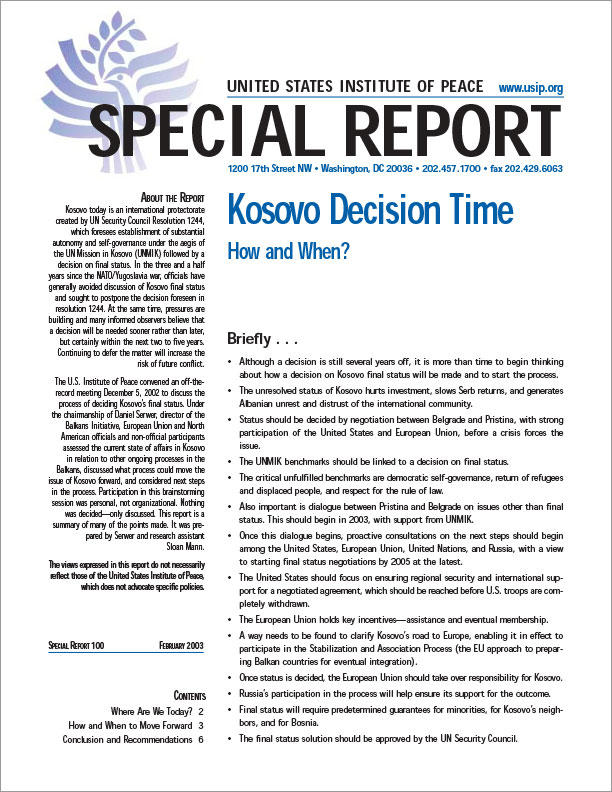Kosovo today is an international protectorate created by UN Security Council Resolution 1244, which foresees establishment of substantial autonomy and self-governance under the aegis of the UN Mission in Kosovo (UNMIK) followed by a decision on final status. In the three and a half years since the NATO/Yugoslavia war, officials have generally avoided discussion of Kosovo final status and sought to postpone the decision foreseen in resolution 1244. At the same time, pressures are building and many informed observers believe that a decision will be needed sooner rather than later, but certainly within the next two to five years. Continuing to defer the matter will increase the risk of future conflict.

Summary
- Although a decision is still several years off, it is more than time to begin thinking about how a decision on Kosovo final status will be made and to start the process.
- The unresolved status of Kosovo hurts investment, slows Serb returns, and generates Albanian unrest and distrust of the international community.
- Status should be decided by negotiation between Belgrade and Pristina, with strong participation of the United States and European Union, before a crisis forces the issue.
- The UNMIK benchmarks should be linked to a decision on final status.
- The critical unfulfilled benchmarks are democratic self-governance, return of refugees and displaced people, and respect for the rule of law.
- Also important is dialogue between Pristina and Belgrade on issues other than final status. This should begin in 2003, with support from UNMIK.
- Once this dialogue begins, proactive consultations on the next steps should begin among the United States, European Union, United Nations, and Russia, with a view to starting final status negotiations by 2005 at the latest.
- The United States should focus on ensuring regional security and international support for a negotiated agreement, which should be reached before U.S. troops are completely withdrawn.
- The European Union holds key incentives—assistance and eventual membership.
- A way needs to be found to clarify Kosovo's road to Europe, enabling it in effect to participate in the Stabilization and Association Process (the EU approach to preparing Balkan countries for eventual integration).
- Once status is decided, the European Union should take over responsibility for Kosovo.
- Russia's participation in the process will help ensure its support for the outcome.
- Final status will require predetermined guarantees for minorities, for Kosovo's neighbors, and for Bosnia.
- The final status solution should be approved by the UN Security Council.
About the Report
Kosovo today is an international protectorate created by UN Security Council Resolution 1244, which foresees establishment of substantial autonomy and self-governance under the aegis of the UN Mission in Kosovo (UNMIK) followed by a decision on final status. In the three and a half years since the NATO/Yugoslavia war, officials have generally avoided discussion of Kosovo final status and sought to postpone the decision foreseen in resolution 1244. At the same time, pressures are building and many informed observers believe that a decision will be needed sooner rather than later, but certainly within the next two to five years. Continuing to defer the matter will increase the risk of future conflict.
The U.S. Institute of Peace convened an off-the-record meeting December 5, 2002 to discuss the process of deciding Kosovo's final status. Under the chairmanship of Daniel Serwer, director of the Balkans Initiative, European Union and North American officials and non-official participants assessed the current state of affairs in Kosovo in relation to other ongoing processes in the Balkans, discussed what process could move the issue of Kosovo forward, and considered next steps in the process. Participation in this brainstorming session was personal, not organizational. Nothing was decided—only discussed. This report is a summary of many of the points made. It was prepared by Serwer and research assistant Sloan Mann.
The views expressed in this report do not necessarily reflect those of the United States Institute of Peace, which does not advocate specific policies